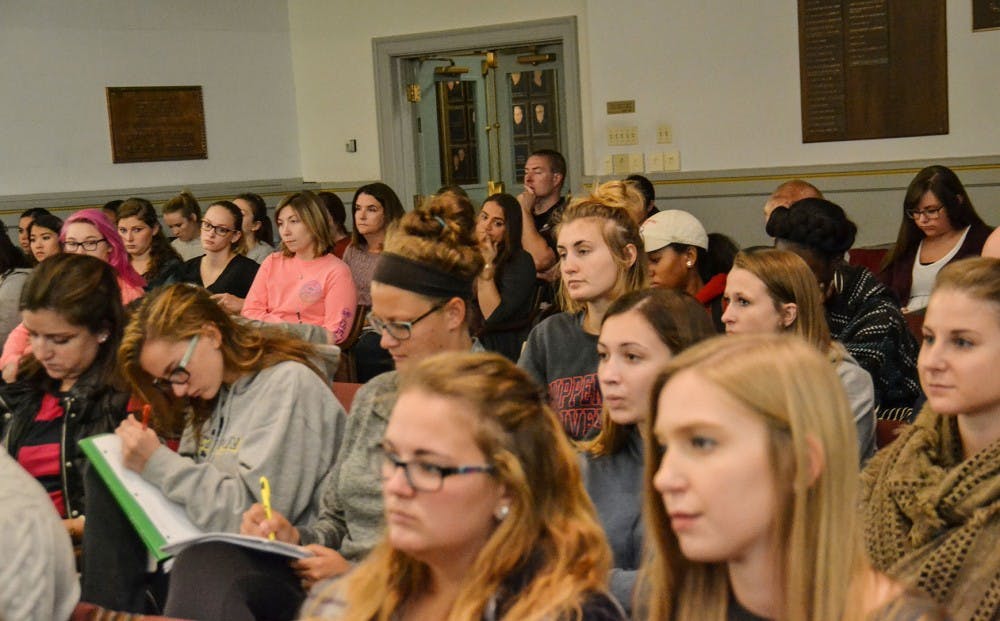Many Pennsylvanians have been confronted with an advertisement for the Pennsylvania Lottery. In these commercials, the state’s second-most famous groundhog coerces potential players by appealing to their collective consciences.
“Benefits older Pennsylvanians every day,” it tells us.
Though many people may hear this phrase and not give it a second thought, more and more Pennsylvanians are being forced to everyday.
“By 2020, one in four Pennsylvanians will be 60 or older,” said Teresa Osborne, the secretary of Pennsylvania’s Department of Aging (DOA), to a room of Shippensburg University gerontology minors.
Osborne gave a presentation Tuesday titled “Vision of Aging Services in PA” at the Old Main Chapel. In her presentation, Osborne provided some insight to the landscape of Pennsylvania’s elderly and the inner workings of the DOA — the primary beneficiary of the Pennsylvania lottery.
The DOA is a cabinet-level agency that was created in 1978 by the Pennsylvania state legislature. Its responsibilities are outlined in the Older Americans act of 1965, which was the foundation for forming a network of federal, state, and local agencies to provide health and wellness services to elderly citizens.
“Under the Older Americans act, we are required to provide eight core services,” said Osborne. They include support, caregiver support, health and wellness programs, in-home care and support, transportation, job training and elder-abuse prevention and resident rights advocacy.
The demand for DOA services has only increased as the population of elderly has. According to Osborne, 10,000 members of the baby-boom generation have turned 65 daily since Jan. 1, 2011, and more and more of these citizens are seeking DOA services.
With the current state of funding, Osborne said she is confident aging services cannot and will not realistically keep pace with these increasing demands.
Though the Pennsylvania DOA has one of the largest departmental budgets in the state at $800 million—78 percent of which comes from the Pennsylvania Lottery— the resources are beginning to run thin.
Osborne stressed the importance of working with other state departments and members of the general assembly in order to strategically plan and prioritize so that the Pennsylvania DOA’s most important services are minimally impacted.
Part of preparing for the future involves ensuring there is a big enough workforce available to meet demand.
With the event primarily geared towards gerontology minors, Osborne outlined her career path in her presentation. She even acknowledged her own bewilderment at her current career.
“If anyone could ever tell me or would ever tell me that I, from a social work student at Marywood University, would be nominated by 47th governor of the commonwealth of Pennsylvania to serve in this capacity, I would tell them that they need some type of mental-health examination.”
Osborne also surrendered the floor to SU alumni and current DOA Administrative Officer, Dan Smedley, so he could tell his story and convey the importance of the department’s work.
“My grandpa lives about five minutes from here, and depends on what we do. And I think about that every day,” said Smedley. “We are the generation that is going to shape and tackle these issues.”
For those interested in utilizing these services or volunteering their time, Cumberland County’s Department of Aging and Community Services is located in Carlisle on 1100 Claremont road. The Cumberland County DOA can also be contacted at (717) 240-6110 or by email at aging@ccpa.net. More information is available online at www.ccpa.net/aging.





The Slate welcomes thoughtful discussion on all of our stories, but please keep comments civil and on-topic. Read our full guidelines here.